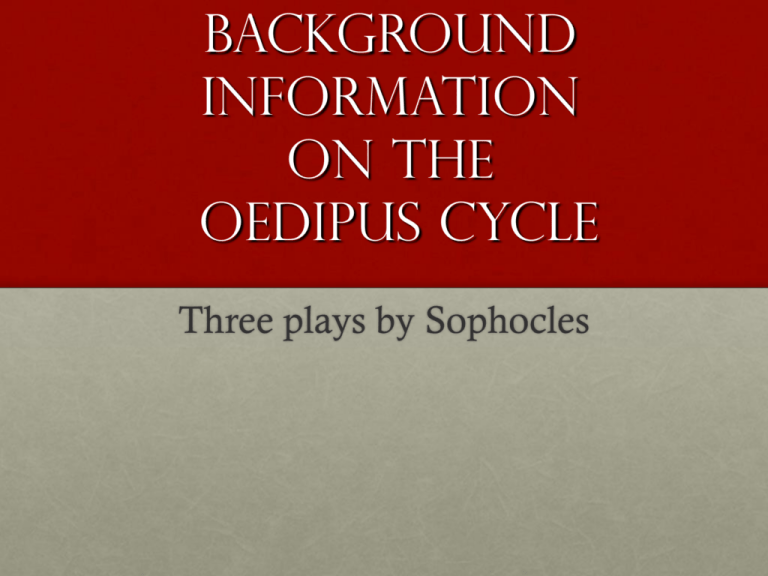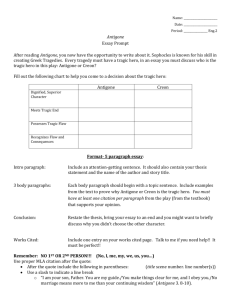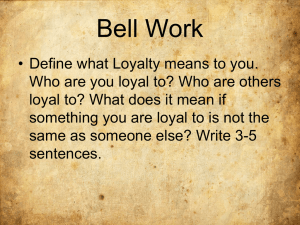Background Antigone PPT
advertisement

Background Information on the Oedipus Cycle Three plays by Sophocles Festival of Dionysus* • Each year, playwrights were chosen to produce three tragedies and one comedy for a theatrical competition at the festival. *the god of wine and fertility Ancient Greek Drama • Plays were performed during the day in outdoor theaters built into hillsides (amphitheaters) The Cycle Play # 1 = Oedipus Rex (Oedipus the King) Play # 2 = Oedipus at Colonus Play # 3 = Antigone (441 B.C.) Ancient Greek Actors Men wore elegant robes with huge masks and elevated shoes to seem larger than life. Masks had exaggerated mouthpieces that amplified their voices and expressed emotion visually. Sophocles used three actors per play. They changed masks to change roles. The Chorus The chorus was a group of 15 men who spoke between scenes to comment on the action. They sometimes participated in the dialogue as well. The chorus was meant to represent the audiences perspective and response. Greek Tragedy A tragedy is a play about the downfall of a dignified, superior character who is involved in historically or socially significant events. Tragic Heroes • Tragic hero: character that is involved in conflict that builds from one event to the next until a catastrophe results. *Fate and a tragic flaw also play key roles in the destruction of the hero’s life. Tragic Flaw • Tragic flaw is usually a positive trait that turns negative that brings about, or contributes to, the tragic hero’s downfall. • Examples: pride (hubris), honesty, honor, confidence, or generosity. Oedipus Rex Watch the summary of Oedipus Rex to learn about this family that repeatedly faces tragic conflict. Conflicts and Concepts • The play Antigone deals with divided loyalties and difficult choices: faith, family, or kingdom? Ideas to Develop into Themes in Antigone Antigone’s conflict deals with differences among the following principles: • Loyalty / obligations to family • Obedience to civil law • Observance of religious law • Protection of personal dignity • Freedom • Protection of community or nation Civil Disobedience: Rebellion with Purpose & Consequence Civil Disobedience: Choosing to disobey the law as a matter of conscience, and accepting the consequences. • Rosa Parks: refusing to relinquish her bus seat = arrested • Conscientious objectors: refusing to fight = jail • Henry David Thoreau: refusing to pay taxes so that his money won’t support programs he disagrees with = jail/fines Characters Antigone (daughter of Oedipus & Jocasta) Ismene (Antigone’s sensible sister) Creon (Jocasta’s brother, Antigone’s Uncle) Haemon (Creon’s son & Antigone’s fiancé) Euridice (Creon’s wife) Teiresias (a blind prophet) Chorus (commentary/summaries in poetry) Choragus (leader of the chorus) A Sentry A Messenger





